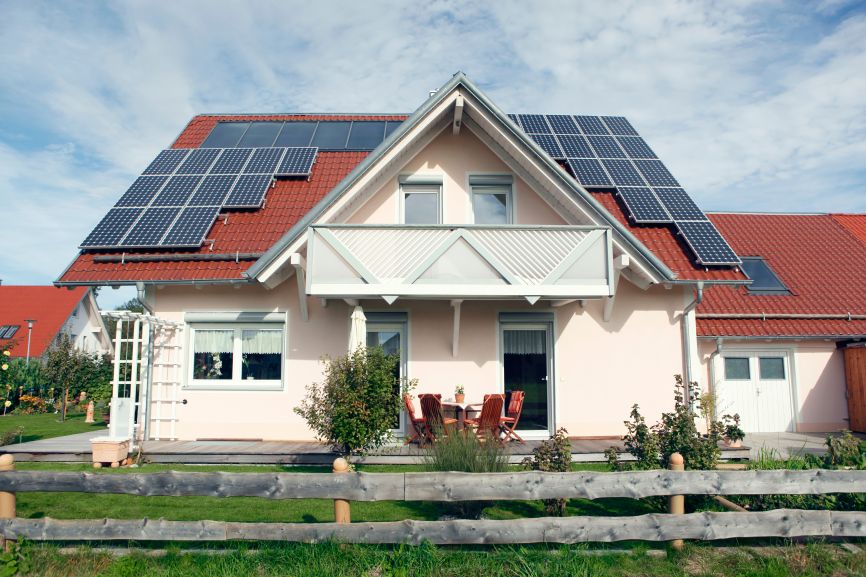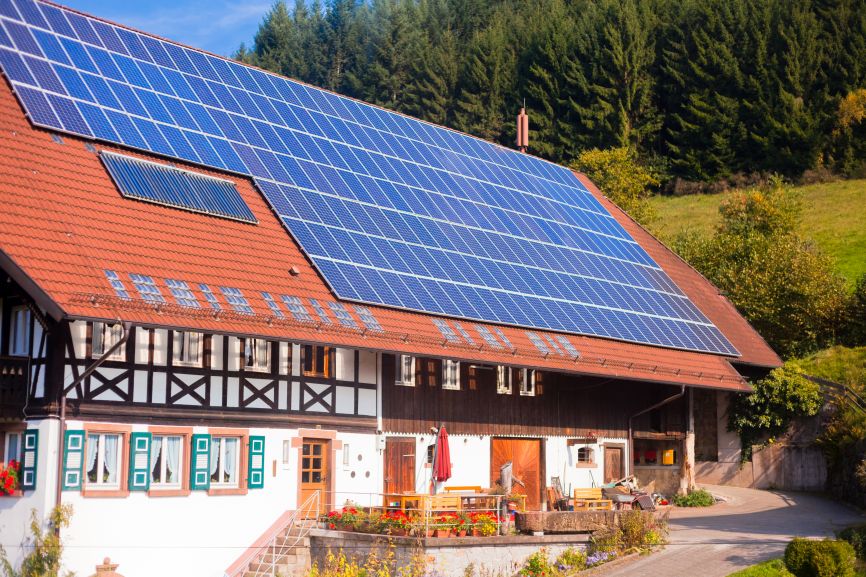Homeowners and business owners exploring solar energy often wonder if batteries are a must-have. You’ve probably heard that solar panels need batteries to store power-but that’s not always true. The truth is, many modern solar systems operate perfectly without batteries, especially in grid-connected homes across New Jersey, Massachusetts, California, and Texas. At First Solar Installers, we help you understand your options, showing how a battery-free system can save you money, simplify setup, and still deliver reliable clean energy tailored to your property.

How Solar Panels Work Without a Battery
Here’s the thing – solar panels without batteries are extremely common. This type of setup is called a grid-tied solar system, and it’s the most widely used residential solar model in the U.S.
In a grid-tied system:
- Your solar panels convert sunlight into DC electricity.
- A solar inverter transforms that DC power into AC electricity that your home can use.
- Any extra energy your panels produce is sent to the utility grid through a program called net metering, earning you credits.
- When your panels aren’t generating enough power (like at night), your home simply draws electricity from the grid.
So yes-you can absolutely run solar panels without a battery, because the grid acts as your backup.
For off-grid setups, things work differently. A few applications, like solar-powered water pumps or small agricultural systems, can run directly off sunlight without storage. These work fine only during daylight hours, which limits when and how they can operate.
Benefits of a Battery-Free Solar System
If you’re considering a solar system without batteries, here’s why it might be the smart move:
Lower Upfront Cost:
Batteries can make up 30–40% of a solar system’s total cost. Removing them means a more affordable installation and faster payback period.
Simpler Installation & Maintenance:
Without batteries, there’s no need for complex wiring or ongoing battery management. Your system is cleaner, easier to maintain, and has fewer components that can fail.
Higher Efficiency:
Battery systems introduce additional energy conversion and storage losses. A direct-to-grid system sends power straight to your home, improving overall efficiency.
Access to Net Metering:
States like California, New Jersey, and Massachusetts offer net metering programs that reward you for sending unused solar energy back to the grid-making your meter spin backward.
Drawbacks to Consider
While solar panels without batteries are efficient and affordable, there are a few trade-offs to keep in mind:
No Backup Power During Outages:
If the grid goes down, your solar panels automatically shut off for safety-meaning you’ll lose power too.
No Energy Storage:
Without a battery, any unused energy goes directly to the grid instead of being stored for later use.
Dependence on Utility Rates:
Your savings depend heavily on your local net metering policies and electricity costs.
If you live in an area prone to blackouts or high utility rates, adding a battery later may be worth considering.

Grid-Tied vs. Off-Grid Solar Without Batteries
| Feature | Grid-Tied Solar | Off-Grid Solar (No Battery) |
| Power Source | Solar + Utility Grid | Solar Only |
| Backup During Outages | No | No |
| Ideal For | Homes & businesses in cities | Specialized daytime-only uses |
| Cost | Lower | Varies by setup |
| Maintenance | Minimal | Moderate |
A grid-tied system is ideal for most homeowners – it’s cost-effective, efficient, and eligible for state incentives and federal tax credits. Off-grid systems without batteries, on the other hand, are limited to small, daylight-only operations like irrigation or workshops.
When Does It Make Sense to Add a Battery Later?
Adding a battery isn’t always necessary at the start, but it’s a smart future-proofing move.
You may want to consider adding battery storage if:
- You live in an area with frequent outages or unstable power.
- You want to achieve energy independence from the grid.
- You plan to use time-of-use billing to save by drawing stored energy during peak hours.
- Your state offers battery rebates or incentives (like California’s SGIP or New Jersey’s Energy Storage Program).
At First Solar Installers, we often design systems that are battery-ready, allowing you to upgrade later without expensive rewiring.
How First Solar Installers Helps You Choose the Right System
Every property and energy need is unique. That’s why our team at First Solar Installers doesn’t just sell panels – we help you design a system that truly fits your lifestyle and goals. Whether you want a simple grid-tied system or a hybrid setup with future battery expansion, we’ll guide you through every option, step by step.
We handle everything from initial consultation and solar design to permits and installation across New Jersey, Massachusetts, California, and Texas – ensuring your switch to solar is smooth, affordable, and built to last.
If you’re unsure whether a battery-free system is right for you, schedule a free consultation with our solar experts today. We’ll break down your options and help you choose the setup that maximizes your savings and reliability.
Related Questions
Can I run AC on solar without a battery?
Yes, if your system is grid-tied. During sunny hours, your panels can power your AC directly. At night or when solar production is low, you’ll draw power from the grid.
How efficient is solar without battery storage?
Grid-tied systems can reach over 90% efficiency since there are no storage losses-making them one of the most efficient solar setups available.
Does solar work at night if connected to the grid?
Your solar panels don’t produce power at night, but your home stays powered through the grid, thanks to net metering credits from daytime production.
Get your free Solar Estimate today or Call us at 844-559-4999